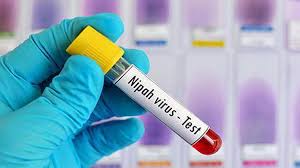Second suspected Nipah death in Kerala; tracing, surveillance stepped up

Kozhikode, July 14 – A second person in Kerala has reportedly died from Nipah virus symptoms, raising concerns and triggering swift public health action. The suspected case emerged from Kozhikode, a district that previously witnessed Nipah outbreaks in 2018 and 2021.
Although lab confirmation is pending, doctors have cited clear signs of the virus. Health teams have begun immediate contact tracing and surveillance to prevent any spread.
Two Deaths Raise Alarms in Kozhikode
The latest suspected victim, a 32-year-old man, showed symptoms like high fever, breathing difficulty, and confusion. Doctors treated him at a private hospital in Kozhikode, but he died despite intensive care.
Earlier this week, a 39-year-old man from the same district also died with similar symptoms. His test results are still awaited.
Health Minister Veena George said samples from both victims were sent to the National Institute of Virology (NIV) in Pune. “We are acting quickly. While tests are ongoing, we’ve started all preventive steps,” she stated during a press briefing.
Contact Tracing and Surveillance Intensify
Health officials have identified and quarantined more than 75 people who had close contact with the two victims. This group includes relatives, neighbors, and healthcare workers.
To stop any possible spread, the government shut down local schools, anganwadis, and religious centers in affected Kozhikode villages.
“We’re focusing on isolation and community-level tracking,” said Dr. Ramesh Kumar, the district medical officer. “We cannot afford delays.”
Kerala’s History With the Virus
The Nipah virus spreads from animals, especially fruit bats, to humans. In severe cases, it causes swelling in the brain and leads to coma or death. So far, there is no vaccine or specific cure.
Kerala has seen several Nipah incidents before:
- In 2018, the virus killed 17 people in Kozhikode and Malappuram.
- In 2021, one confirmed death occurred, but health workers quickly contained the threat.
These earlier outbreaks helped Kerala build better emergency plans, which are now being reactivated.
Hospitals on High Alert
Hospitals across Kozhikode have started setting up special isolation wards. Staff members have stocked up on protective gear and medicines. Ambulance drivers and nurses are getting trained to handle potential cases.
Experts from the Indian Council of Medical Research (ICMR) and the National Centre for Disease Control (NCDC) are monitoring the situation. They’ve kept mobile testing labs ready for emergency use.
“We’re also testing animals like bats and pigs in nearby areas,” added Dr. Kumar. “Zoonotic tracking is key.”
Public Gets Advisory
The Health Department has urged residents to stay alert but avoid panic. The advisory includes the following precautions:
- Don’t eat fruits partially eaten by birds or bats.
- Stay away from trees with visible bat colonies.
- Use face masks in public places and practice frequent handwashing.
- Seek medical care if symptoms like fever, vomiting, or confusion appear.
Local ASHA workers have started visiting homes to raise awareness. District helplines are also active 24/7.
Government and Central Support
Chief Minister Pinarayi Vijayan reviewed the situation on Sunday. He urged citizens to cooperate with medical teams. He also requested central help for lab testing and expert guidance.
Union Health Minister Mansukh Mandaviya responded positively. He assured that a central team is on standby to assist Kerala if the situation worsens.
“The Centre is ready to support Kerala with all resources,” he posted on X (formerly Twitter).
Fear and Rumors in the Community
Despite the government’s efforts, fear has started to spread. Some social media users are sharing unverified news, which has only added to public worry.
Officials warned that they will take legal action against those spreading panic. “We are already tracing social media accounts behind fake claims,” said a senior police officer.
Local residents, especially parents, expressed concern. “We are scared to send our children to school,” said Priya Menon, a teacher from Kozhikode. “We just hope the virus hasn’t spread.”
Awaiting Confirmation
As the state waits for test results from Pune’s virology lab, public health officials are staying on high alert. If either case confirms Nipah, stricter controls and travel limits may follow.
For now, the focus remains on tracing contacts, isolating symptoms, and raising public awareness.






